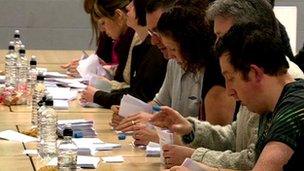Salford referendum votes for directly elected mayor
- Published

The result means Salford residents will vote for their first directly elected in mayor in May
People in Salford will have the chance to vote for a new city leader next May after a referendum backed proposals for a directly elected mayor.
In the poll, 17,344 people voted yes, while 13,653 voted against having an elected mayor.
The result means residents will vote on 3 May to choose a mayor who will usher in a new process of running the city.
But just 18.1% of the 171,000 eligible voters took part in the referendum.
The current leader of the council, Labour's John Merry, said he would put his name forward to be his party's candidate in the election.
'Out of touch'
The vote was triggered after the English Democrat Party handed a petition with 10,500 signatures to the council last July.
Any local authority is legally obliged to hold a referendum if more than 5% of the electorate sign a petition under the Local Government Act of 2000.
Local businessman Geoffrey Berg, who organised the petition, said he was pleased with the result, which saw the Yes campaign receive 56% of the vote and record a majority of 3,691.
"I'm very pleased about it because the council originally said there should not be a vote," he said.
"They are out of touch with the wishes of the people they are representing. It was a low turnout but an even lower vote for the position of the council."
Mr Berg is now set to meet the English Democrats and independents to decide their choice of candidate.
Mr Merry's Labour group had campaigned for a No vote.
He said: "The real issue is the future of Salford and that's what I will be fighting for."
The local Conservative Party had backed the Yes campaign, in line with the government's Localism Bill.
'Policies for future'
Hazel Blears, the Labour MP for Salford and Eccles, said: "It is obviously disappointing when there is a low turnout in any kind of ballot but that's the beauty of democracy, the people are in charge and the people decide.
"The next stage of this is to elect a mayor who will be elected on policies that people care about.
"And our job as a party will be to develop policies for the future of Salford and contrast those with some of the policies put forward during this referendum, such as cutting council tax by 50%.
"This would result in serious cuts to services, care for the elderly, cleaning the streets, collecting the bins, services for children in care and at risk, which will be under threat by a massive council tax cut."
Council officials had prepared a draft constitution, in the event of a yes vote.
Eleven other English cities will vote in May on whether to have elected mayors.
They are Salford's neighbour Manchester and Birmingham, Bristol, Bradford, Coventry, Leeds, Liverpool, Newcastle, Nottingham, Sheffield and Wakefield.
The government announced on Wednesday it planned to hold any resulting mayoral elections on 15 November, the same date as polling for 40 police commissioners.
Mayors could get powers over rail and bus services, skills and apprenticeships and money to invest in high-speed broadband and other economic infrastructure.
- Published26 January 2012
- Published25 January 2012
- Published24 January 2012
- Published1 December 2011
- Published20 September 2011